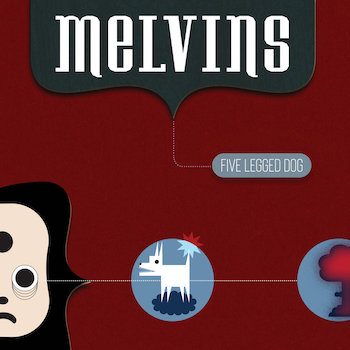Rock Feature: Melvins Turns 40 — One of the “Twins of Evil”
By Scott McLennan
“I always thought this would last six months,” confesses Melvins guitarist, singer, and songwriter Buzz Osborne. “You really can’t count on anything.”
Melvins, Boris, and Mr. Phylzzz will be performing Sept. 19 at The Paradise in Boston.

Melvins — its brand of provocation transcends predictable party lines. Photo: Chris Casella
Perhaps one of the reasons the Melvins has lasted for four decades is that, when the band formed, its members never really thought about what being a band for 40 years would look like. “I always thought this would last six months,” confesses Melvins guitarist, singer, and songwriter Buzz Osborne. “You really can’t count on anything.”
And Osborne can say that bit about not counting on anything with conviction.
For example, a mere week before the Melvins was set to hit the road for a lengthy 40th-anniversary tour, drummer Dale Crover, who has been playing with Osborne since 1984, was rushed to the hospital for emergency surgery on his spine.
But unpredictability, thankfully, can cut both ways. Osborne and current Melvins bassist Steve McDonald (of Redd Kross and OFF! fame) were then able to recruit Big Business drummer Coady Willis, who routinely played alongside Crover in the Melvins from 2006 to 2015. Not only were they able to wrangle Willis, but it just so happened that the set being prepped for the tour featured many of the songs from the era in which Willis was active in the band.
As Osborne tells it, tour mates Boris wanted the shows to feature each band playing one of its albums in its entirety.
“They asked us to do Bullhead,” said Osborne, referring to the Melvins’ 1991 album, which includes the song that Boris picked for the band’s moniker. “But that record is about 35 minutes long, so we needed other songs to fill out the set. The songs we had picked just happened to be the ones from the Coady era.”
Boris is performing its 2002 album Heavy Rocks on what has been dubbed the “Twins of Evil” tour.
Willis was able to rehearse with the Melvins three times before the tour launched in Los Angeles.
“It worked,” Osborne said. “The dynamic nature of his playing makes him a good fit and he understands our ideas.”
Despite being purposely weird with its music, Melvins has endured, securing a devoted following for the band’s steady stream of releases. On top of that, they have cultivated a middle layer of fans that can be counted on to fill up the seats in whatever 1,000-seat venue the band rolls into. And, intriguingly, Melvins’ healthy legacy connects the band to both the rock underground and more mainstream heavy music. For a few years in the mid-’90s, when record labels were stumbling over themselves to find another Pearl Jam or Nirvana (a band that Crover was playing with before he opted to stick with Osborne instead), Atlantic Records brought Melvins onto its roster. That mightily boosted the visibility of a band that featured a wild-haired guitar player and whose music was a blasting amalgam of metal and punk that could also embrace the classic sleaze of Kiss and Alice Cooper.
Even though the Atlantic years yielded what are considered to be three classic Melvins albums (Houdini, Stoner Witch, and Stag), it surprised no one that the record label dropped the band when it became abundantly clear the group was sticking to its explorations of noisy, sludgy, dark, dynamic, and pugilistic sounds.
Ironically, Osborne said that it was easier to deal with the venial proclivities of corporate record labels than the practices of the various independent imprints that have released Melvins music over the decades. “Indie labels are 10 times worse than major labels. They don’t pay artists, and you can’t go after them because they have no money,” Osborne said.
Referring to Melvins’ 1987 debut album Gluey Porch Treatments, Osborne said he didn’t make a single dollar off of that album until many years later when he bought it back from the indie label that released it and rereleased it himself.
 These days, Melvins maintain a good relationship with two indie labels, Ipecac Recordings and Amphetamine Reptile Records, both of which are operated by artists with similar interests in the musical fringes. Last year, Melvins released the relentlessly heavy Bad Mood Rising on Amphetamine Reptile, while in 2021 the band worked with Ipecac Recordings to release the sprawling Five Legged Dog, which contains 36 acoustic tracks, mostly versions of songs from the band’s catalog mixed with covers of material by The Rolling Stones, Turtles, Redd Kross, and others.
These days, Melvins maintain a good relationship with two indie labels, Ipecac Recordings and Amphetamine Reptile Records, both of which are operated by artists with similar interests in the musical fringes. Last year, Melvins released the relentlessly heavy Bad Mood Rising on Amphetamine Reptile, while in 2021 the band worked with Ipecac Recordings to release the sprawling Five Legged Dog, which contains 36 acoustic tracks, mostly versions of songs from the band’s catalog mixed with covers of material by The Rolling Stones, Turtles, Redd Kross, and others.
“If you don’t have creative control, it’s your own fault,” Osborne said. “I like what Johnny Rotten said: ‘The minute someone dictates, I cease to function.’”
That sense of independence is coupled with a strong work ethic. Osborne and the Melvins creative team produce finely detailed, limited-edition records that sell out in a flash. After that, much of the music is then made available on streaming sites and less pricey CDs and albums. He said a new Melvins record is in the can.
Osborne said he never wanted to be associated with any one particular music scene or genre. Likewise, Melvins’ own brand of provocation transcends predictable party lines. He called politics the “art of divide and conquer,” and this self-described “Groucho Marxist” explained that he didn’t have much faith in political systems to produce meaningful positive change. Osborne paraphrased Nietzsche, saying “Everything a politician says is a lie, every bit of a politician’s money is stolen.”
So, while in 1983 there was no thought of the band’s future, Melvins have proven what is possible by sticking to the ideas that made you want to start a band in the first place.
“I have good taste in music, and I make music that I like, and I hope others like it too,” Osborne said. “But the minute someone says, ‘You know what you should do?’, that conversation is over.”
Scott McLennan covered music for the Worcester Telegram & Gazette from 1993 to 2008. He then contributed music reviews and features to the Boston Globe, Providence Journal, Portland Press Herald, and WGBH, as well as to the Arts Fuse. He also operated the NE Metal blog to provide in-depth coverage of the region’s heavy metal scene.
